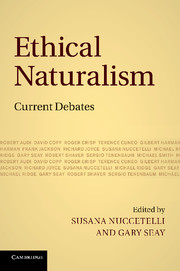Book contents
- Frontmatter
- Contents
- Contributors
- Introduction
- Chapter 1 Naturalism in moral philosophy
- Chapter 2 Normativity and reasons: five arguments from Parfit against normative naturalism
- Chapter 3 Naturalism: feel the width
- Chapter 4 On ethical naturalism and the philosophy of language
- Chapter 5 Metaethical pluralism: how both moral naturalism and moral skepticism may be permissible positions
- Chapter 6 Moral naturalism and categorical reasons
- Chapter 7 Does analytical moral naturalism rest on a mistake?
- Chapter 8 Supervenience and the nature of normativity
- Chapter 9 Can normativity be naturalized?
- Chapter 10 Ethical non-naturalism and experimental philosophy
- Chapter 11 Externalism, motivation, and moral knowledge
- Chapter 12 Naturalism, absolutism, relativism
- Bibliography
- Index
Chapter 10 - Ethical non-naturalism and experimental philosophy
Published online by Cambridge University Press: 05 January 2012
- Frontmatter
- Contents
- Contributors
- Introduction
- Chapter 1 Naturalism in moral philosophy
- Chapter 2 Normativity and reasons: five arguments from Parfit against normative naturalism
- Chapter 3 Naturalism: feel the width
- Chapter 4 On ethical naturalism and the philosophy of language
- Chapter 5 Metaethical pluralism: how both moral naturalism and moral skepticism may be permissible positions
- Chapter 6 Moral naturalism and categorical reasons
- Chapter 7 Does analytical moral naturalism rest on a mistake?
- Chapter 8 Supervenience and the nature of normativity
- Chapter 9 Can normativity be naturalized?
- Chapter 10 Ethical non-naturalism and experimental philosophy
- Chapter 11 Externalism, motivation, and moral knowledge
- Chapter 12 Naturalism, absolutism, relativism
- Bibliography
- Index
Summary
One thing – perhaps the main thing – that the classic non-naturalists wanted to protect was a specific epistemology. Say I am tempted to think that X is right because X maximizes pleasure and whatever maximizes pleasure is right. I need to reflect on cases such as these: (1) Say that X maximizes whatever is good, but involves breaking a promise. If I keep the promise, only slightly less total good will result. Should I perform X? (2) Say that worlds A and B have equal amounts of pleasure, but A has more knowledge, or more virtue, or a more just distribution of the pleasure. Do A and B have the same amount of value, or is there more value in A? Ross, who gives these examples, hopes that in (1) one thinks one should keep the promise, and in (2) one thinks there is more value in A. If one agrees with Ross, one does not think that whatever maximizes pleasure is right; the right is not simply a function of the good, and there are goods in addition to pleasure (Ross 1930: 34–35, 134–35, 138–40). The correct way to decide whether X is right is to elicit the intuitions of “the best people,” “thoughtful and well-educated people,” about thought experiments such as these, rather than for anyone to perform, exclusively, purely empirical work (Ross 1930: 41). The non-naturalists took naturalists to deny this.
My concern is what impact, if any, recent work stemming from the psychology and experimental philosophy literatures should have on this debate. Some of this work, especially from epistemology, is hostile to appeals to intuition, and there are parallel empirical findings in ethics that could justify similar hostility to the appeals to intuition prized by the non-naturalists.
Keywords
- Type
- Chapter
- Information
- Ethical NaturalismCurrent Debates, pp. 194 - 210Publisher: Cambridge University PressPrint publication year: 2011



